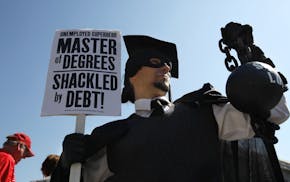Shareholders of Polaris and Best Buy reacted predictably last week to news that the companies had each made a bet on the future of electric motorcycles.
Polaris shares leaped to a 52-week high on the news that the Medina firm, known mostly for its off-road snowmobiles and all-terrain vehicles, had taken a minority stake in Brammo, an Oregon company that has developed an electric motorcycle.
Best Buy investors who happened upon the Polaris announcement learned that the Richfield-based electronics giant is also a Brammo investor. They were left to scratch their collective heads and wonder, "What the ... ?"
There's a lot of that going on at Best Buy these days. The nation's biggest electronic retailer has looked like a slow-footed giant lurching through the retail wilds for most of the past year. Revenue is flat, same-store sales are down and the company's shares have lost almost 39 percent of their value.
The Brammo investment isn't going to noticeably alter the retailer's fortunes one way or the other, but it does raise larger concerns about focus and priorities. The kindest thing that might be said about Best Buy being in the venture capital business is that it's an inefficient use of shareholder money. A less charitable take would be that it has all the makings of a vanity project.
Best Buy defended the unit via e-mail but declined to make investment professionals available or provide details about the number of deals, the average investment, or the size of the investment fund.
"We have a responsibility to our customers, and to our business, to look ahead and anticipate how our business will meet the needs of consumers as they adopt new technologies," the e-mail said. "Investments by Best Buy, including those by our Best Buy Capital unit, are designed to encourage ventures that show long-term potential in satisfying consumer wants and needs in the electronics and technology space."
Current woes aside, Best Buy is arguably the most successful merchandiser of consumer technology of the last three decades. But being a technology venture capitalist requires different skills, higher risk tolerance and full-time focus. Hiring some former investment bankers will never allow Best Buy to attain the scale or expertise necessary to achieve the home runs that make up for mostly singles and strikeouts.
This is not an argument against taking risks. Companies must innovate to stay competitive, even if that means failing once in a while.
Buying Geek Squad and forming a joint venture with Carphone Warehouse were worthy risks because management seized opportunities to extend Best Buy's comparative advantage in consumer electronics retailing.
Even when these bets don't pay off -- remember Musicland? -- it's OK because smart companies learn something from the experience.
The returns from investing directly in start-ups seem less tangible.
Best Buy says those deals allow it to keep a finger on the pulse of emerging technologies, while helping nurture new ones. The rollout of home energy management products in some stores grew indirectly out of conversations resulting from its investment in Brammo, said spokeswoman Kelly Groehler.
But Best Buy could achieve many of the same objectives by investing directly with a venture capital fund. The market for vetting business plans and sorting winners and losers is already highly efficient, while Best Buy's own track record in this regard is somewhat mixed. It would be hard to make the case that consumers were clamoring for another streaming music service in 2008, for example, when Best Buy paid $121 million for Napster, which is now for sale.
Aside from electric motorcycles, Best Buy Capital's other investments include an Oregon chip company; a North Carolina firm, Valancell, that has developed audio headsets that monitor and report the health and fitness of the user; a Massachusetts start-up, Zeo, that makes in-home sleep tracking devices and applications; and a Silicon Valley company developing facial-recognition software for mobile devices. None of the investments appears to be in the Twin Cities.
Best Buy describes the investments as important to its future, but you won't find any mention of them in Best Buy news releases or securities filings dating back to 2008, the year Best Buy Capital was formed. I found them on CrunchBase, a website that follows the venture capital industry.
Best Buy says it's not required to disclose the activities of Best Buy Capital because its investments are too small to be considered "material" in the eyes of regulators.
Which is my point, too.
ericw@startribune.com • 612-673-1736

Wieffering: Time to get over debit card fees
For Thrivent and others, warnings were there

With billions in sales, some co-ops are big business
